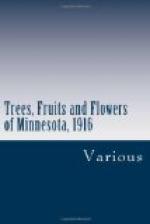Mr. Miller: In saving your seed from year to year, is there any danger of the seed running out in time?
Mr. Purdham: I don’t think so. If you take your best tomatoes I think you will improve them.
Mr. Miller: I should think the germination of that seed would run out?
Mr. Purdham: That may be, I can’t say as to that. There are people that make a specialty of studying that.
Annual Report, 1915, Vice-President, First Congressional District.
F. I. HARRIS, LA CRESCENT, MINN.
In making a report for the First Congressional District, I will say at the beginning, that all my observations and interviews were taken in Houston and Winona counties, an especially favored locality this year, and I am well aware that the conditions and results are exceptional and do not form a just estimate for the district and are certainly very much above the average. The apple crop in the section named was a record breaker, and where trees were at all cared for and properly sprayed the quality and size of the fruit was very superior and remarkably free from insect pests and disease.
[Illustration: Bridge on Lakeside Drive, at Albert Lea, in First Congressional District.]
The yield of several orchards in this vicinity was from 1,000 to 15,000 barrels of marketable fruit, an increase of nearly 100 per cent above the largest previous crop. From this station twenty-one carload lots of apples, averaging 200 barrels per car, were shipped, besides nearly as many more sold in the local markets of La Crosse and Winona and shipped in small lots by freight and express. The prices obtained were in all cases good, considering that the varieties grown are mostly summer and fall and had to be sold in competition with Iowa and Illinois fruit. While all markets were over-supplied, the demand for the quality of fruit grown here in the commercial orchards was greatly in excess of the supply and attracted buyers from Chicago and the Twin Cities and has built a permanent market so long as the quality keeps up to this year’s standard.
At the same time, I am more than ever impressed with the necessity for some manner of utilizing the surplus and low grade fruit with which the local markets are flooded. It seems a great waste to have thousands of bushels of apples fed to hogs and left to rot on the ground which would be a large asset if converted into vinegar or canned. More than one-half the fruit brought from farms is only fit for such use and by being forced on the market serves to lower prices and demand for good fruit. I visited one farm orchard within twenty miles of here and saw at a low estimate 400 bushels of apples lying on the ground, all of which could have been utilized in a factory, but not having been sprayed were not fit for barreling, and the owner had turned the hogs in to get rid of them. This is a condition that is sure to become worse in view of the many small orchards recently set, besides the commercial orchards that are just coming into bearing. From the reports received, in reply to circulars sent out, I gather that the crop varied from nothing to 100 per cent and the quality in corresponding ratio, depending in most cases upon whether orchards were properly sprayed or neglected.




